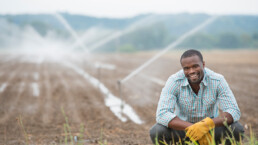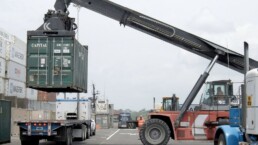The agricultural sector in the continent has experienced its worst since mid-2019 with locust infestation and flooding bringing about food insecurity. Climate change also continues to present unique sustainability challenges in the continent threatening its ability to achieve food security, poverty eradication, and more broadly economic and social objectives. The COVID-19 pandemic has further exacerbated these challenges by disrupting the short term production systems and distribution channels of agro-food systems. Management measures of the pandemic such as lockdowns have restricted labour mobility, demand and supply of farming inputs as well as informal trading activities within and between countries. The overall effects have been felt particularly by smallholder farmers who are the majority in the continent, some of whom are already vulnerable due to low levels of education, low incomes among many other challenges. This article discusses these challenges and provides key considerations on the potential of digital technologies to support greater resilience of the agri-food systems post-COVID.
The agri-food sector being one of the many sectors negatively impacted by the shocks and effects of the pandemic has shown volatility and will need to undergo significant change to improve its performance and resilience. Now more than ever there is a need for the applications of Science Technology and Innovation to bring solutions to these challenges. Investments in science through research are needed to develop solutions related to climate change and the COVID-19 pandemic. A number of stakeholders have also called for structural transformation in the agri-food systems particularly by transitioning to a diversified, industrial and productive sector to support food distribution and production. Others have called for the application of research and innovation through practices such as modernization of farm production, shifting production towards more value addition while strengthening smallholder farmers to adapt and improve performance.
There is growing consensus on the need to broaden particular aspects in the agri-food systems to achieve this transformation. Emerging are long discussions on leveraging technological advancements, particularly digital technologies. Digital technological applications may support enhancement of the gains made in achieving food security through supporting food transportation, marketing, data collection and information sharing. They are also key in supporting diverse farming systems and supporting other agro-ecological approaches that are more sustainable. For example a number of farmers have diversified to the use of organic inputs as a result of inaccessible markets. There are also examples in East Africa, where Kenyan farmers are using digital apps to deliver inputs, and organizations are using digital technologies through short code services available on phones to provide extension services that have replaced face to face interaction.
The pandemic has demonstrated that digital technologies can be leveraged to support agro-food systems transformation. However, there have also been some criticisms against their use. While their potential for ensuring inclusivity for smallholder farmers including women and youth has been fully acknowledged during the COVID-19 pandemic, it has also been argued that such technologies are likely to exclude farmers who are illiterate and those who cannot access some of these technologies due to financial constraints, thereby enhancing further inequality. For example if the digital availability of information and data on production and food prices is not properly managed, it will only benefit the few marketing companies who can use this data to their advantage to inflate food prices. Also, more advanced technologies like the use of drones for pesticide application in replacement of manual labor due to restricted movements can be utilized mainly by a few of the farmers who have the financial muscle and capabilities to purchase drones.
This therefore calls for better action and rethinking of how to support the provision of digital technologies both in the short term and long term to make sure they are more inclusive and comprehensively beneficial in the agri-food sector. This article presents three key considerations. Firstly, there is a need to support and invest in increasing the digital literacy capacities and capabilities including ensuring access to low cost digital technologies for all the farmers. Secondly, there is a need for proper financial support systems that can enable farmers’ access to finances to acquire some of the digital technologies. Thirdly, public policies need to be put in place to continue supporting the most vulnerable while ensuring inclusivity in the use of the technologies. For example a directive issued by the President of Kenya to explore ways of reducing the risk of COVID-19 transmission through physical cash has seen implementation of money transfer and mobile payments that are affordable to all. This has supported the vulnerable and enhanced the use of digital tools.
Overall, a lot of investment and institutional support is required to ensure access to infrastructural support for smallholder farmers to embrace and use digital technologies. In addition to making them affordable, there is a need for digital technologies to be much more user- centered in terms of their design to ensure sustainability of the short term gains made during the pandemic. These actions if taken up will support greater resilience of the agri-food systems and application of digital technologies even post COVID-19.
The views expressed in this article are those of the author alone and not the Future Africa Forum.
The views expressed in this article are those of the author and do not necessarily reflect the views of Future Africa Forum. Future Africa Forum is a pan-African policy think-tank and policy advisory consultancy headquartered in Nairobi, Kenya.



